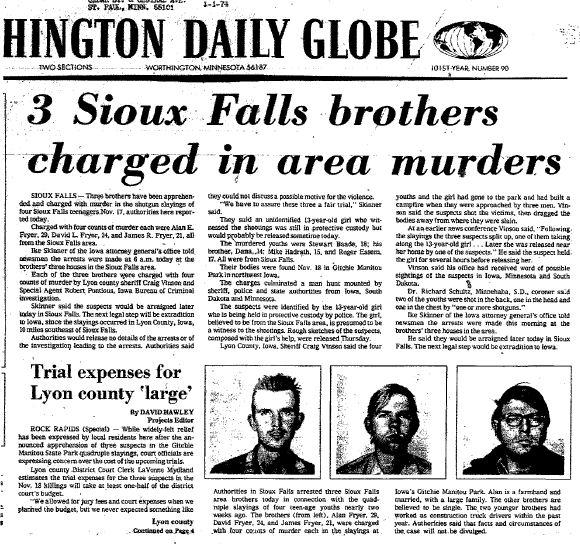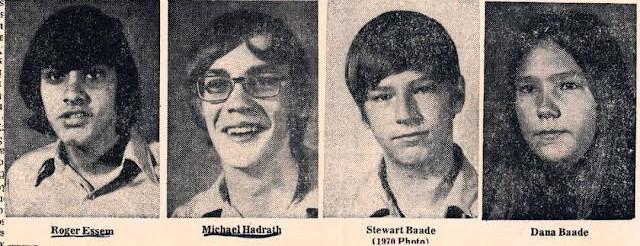
Summary
Name:
James FryerYears Active:
1973Status:
ImprisonedClass:
Mass MurdererVictims:
4Method:
ShootingNationality:
USA
Summary: Mass Murderer
Name:
James FryerStatus:
ImprisonedVictims:
4Method:
ShootingNationality:
USAYears Active:
1973Date Convicted:
December 20, 1974bio
James Fryer was the youngest of the three Fryer brothers involved in the 1973 Gitchie Manitou murders. Born in 1952 and raised in Sioux Falls, South Dakota, James grew up in a home that, according to later evaluations, lacked strong discipline or structure. By the time of the murders, James was 21 years old and already serving time in jail for unrelated offenses when the investigation into the Gitchie Manitou case began.
Described by a court-appointed psychiatrist as having an IQ of around 85, James was considered to have borderline intellectual functioning. He was reported to have trouble with impulse control and understanding the consequences of his actions. Despite being the youngest, James took part in every phase of the crime, including the rape and killings. Unlike his brothers, James never took on a leadership role but still fully participated and bore equal responsibility in the brutality that unfolded that night.
He seemed to follow his brothers—particularly Allen—with a mix of fear and loyalty. Yet when it came time for trial, James displayed a pattern of blame-shifting and denial, even as evidence and witness testimony stacked heavily against him. During the trial, no public displays of remorse or empathy were recorded, and he gave no significant statements of apology or reflection.
murder story
On the night of November 17, 1973, James Fryer and his brothers Allen and David went to Gitchie Manitou State Preserve in Iowa. They stumbled upon a group of five teenagers—Roger Essem, Stewart Baade, Dana Baade, Michael Hadrath, and Sandra Cheskey—sitting around a campfire. Believing the group had marijuana, the Fryers planned a fake drug bust, pretending to be police officers. They retrieved shotguns from their vehicle and ambushed the teens from a hill above.

Roger Essem, 17, was shot and killed instantly. Stewart Baade, 18, was seriously wounded. The rest scattered into the woods. Using fear, impersonation, and firearms, the Fryers lured Michael Hadrath, 15, and Sandra Cheskey, 13, out of hiding. Hadrath was shot in the arm. Along with Dana Baade, 14, the group was corralled and led away from the campsite by David and Allen, while James Fryer returned with a truck to assist.
Sandra was tied and placed in the truck, while Allen drove her off-site. Meanwhile, James and David Fryer executed the wounded and terrified remaining teens—Hadrath, Dana Baade, and Stewart Baade—with shotgun blasts.
Later that night, James drove to an abandoned farmhouse in Hartford, South Dakota, where Allen had taken Sandra. Inside the truck, James raped the 13-year-old, then left her with Allen. The brothers later tried to downplay their involvement, but forensic evidence, the discovery of the farmhouse, and Sandra’s chilling and composed testimony would undo their defense.

Sandra Cheskey, the sole survivor, identified all three brothers. Her description of James Fryer, the truck, the location of the farmhouse (recognized by a distinct red fuel tank), and details of the assault were all corroborated by the investigation.
James was arrested on November 30, 1973, and charged with four counts of murder. He remained in custody while his brothers were transferred to Lyon County, Iowa. On June 18, 1974, after Allen’s trial concluded, James and Allen escaped jail, stole a vehicle, and fled to Wyoming, where they were caught in Gillette and returned to face federal charges.
His trial began on December 3, 1974, but due to publicity, the venue was changed to Dickinson County, Iowa, where it resumed on December 11. Cheskey testified, along with state investigators. A psychiatrist testified about James’s cognitive limitations, but the jury ultimately found him competent and fully responsible.
On December 20, 1974, James was convicted of three counts of first-degree murder and one count of manslaughter. On January 7, 1975, he was sentenced to three concurrent life terms and eight additional years. Despite the confirmed rape of Cheskey, prosecutors chose not to re-try James for the sexual assault, as he was already facing life without parole and Cheskey would have been subjected to further trauma.